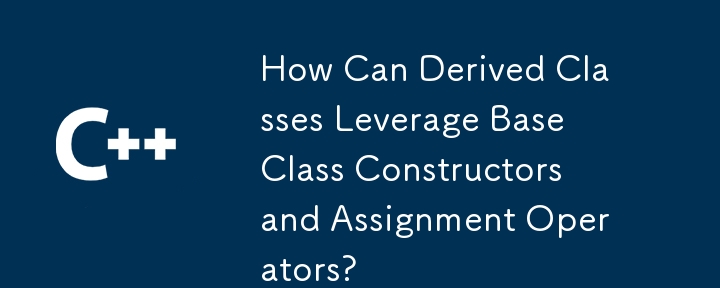派生类如何利用基类构造函数和赋值运算符?
- Mary-Kate Olsen原创
- 2024-11-03 14:31:02994浏览

在派生类中使用基类构造函数和赋值运算符
在 C 中,继承允许派生类继承其基类的某些功能。但是,如果派生类需要与其基类相同的构造函数和赋值运算符集,则可能需要在派生类中重写这些函数。这可能是一项乏味的任务,特别是对于需要访问私有成员变量的赋值运算符。
幸运的是,有一个替代解决方案。派生类可以显式调用基类构造函数和赋值运算符。这种技术允许他们利用现有的实现,而无需重写它。
考虑以下代码示例:
<code class="cpp">class Base {
public:
Base();
Base(const string& s);
Base(const Base& b) { (*this) = b; }
Base& operator=(const Base & b);
private:
// ... (private member variables and functions)
};
class Derived : public Base {
public:
// Override the "foo" function without modifying other aspects of the base class
virtual void foo() override;
};</code>
在此示例中,Derived 继承了 Base 的构造函数和赋值运算符。它不需要显式定义这些函数。相反,当构造 Derived 对象或将 Base 对象分配给 Derived 对象时,编译器会自动调用适当的基类构造函数或赋值运算符。
相同的策略可用于赋值运算符:
<code class="cpp">class Base {
public:
// ... (private member variables and functions)
Base(const Base& b) { /* ... */ }
Base& operator=(const Base& b) { /* ... */ }
};
class Derived : public Base {
public:
int additional_;
// Call the base assignment operator within the derived operator
Derived& operator=(const Derived& d) {
Base::operator=(d);
additional_ = d.additional_;
return *this;
}
};</code>
此技术允许派生类充分利用其基类的功能,同时仅覆盖或添加必要的行为。它无需重写复杂的基类构造函数或赋值运算符,从而简化了继承。
以上是派生类如何利用基类构造函数和赋值运算符?的详细内容。更多信息请关注PHP中文网其他相关文章!
声明:
本文内容由网友自发贡献,版权归原作者所有,本站不承担相应法律责任。如您发现有涉嫌抄袭侵权的内容,请联系admin@php.cn

